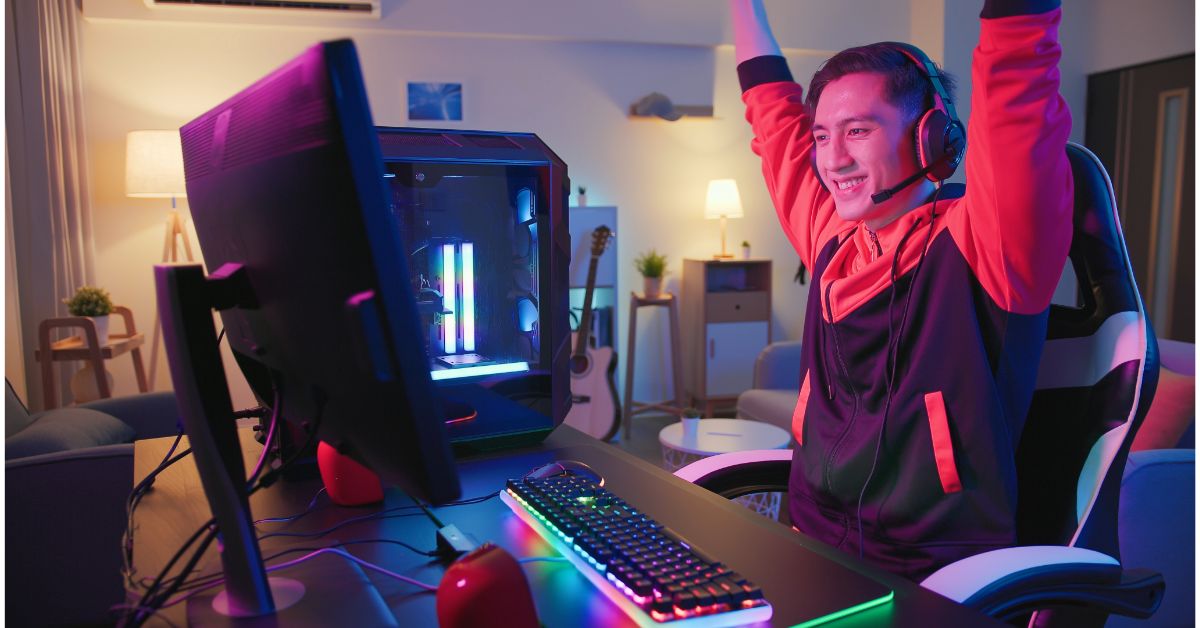Have you ever dreamed of turning your love for video games into a full-time job? With the rise of e-sports, this dream is becoming a reality for many gamers. What does it take to become a professional gamer?

The Path to Becoming a Professional Gamer
Turning gaming into a career isn’t as simple as playing games all day. It requires dedication, skill, and a strategic approach. Here are the main steps to becoming a professional gamer:
- Master Your Game: To be successful in e-sports, you need to excel at a specific game. This means spending countless hours practicing and refining your skills. Top players often practice for six to twelve hours a day, analyzing their gameplay and learning new strategies.1
- Build Your Online Presence: In the world of e-sports, having a strong online presence is crucial. Many gamers start by streaming their gameplay on platforms like Twitch or YouTube. This helps build an audience and gain recognition. Engaging with fans through social media and participating in gaming communities can also boost your visibility.
- Join a Team: Once you’ve honed your skills and built an online following, joining a professional team can be the next step. Teams often look for talented players who can contribute to their success. Networking with other gamers and participating in amateur tournaments can help you get noticed by team scouts.
- Compete in Tournaments: Participating in tournaments is a key part of being a professional gamer. These competitions can range from local events to international championships. Performing well in tournaments can lead to sponsorships, prize money, and greater recognition in the gaming community.
Financial Considerations
Turning gaming into a full-time career involves several financial aspects that need careful planning:
- Income Sources: Professional gamers earn money from various sources. These include tournament prize money, salaries from teams, sponsorships, and streaming revenue. Some gamers also earn through merchandise sales, such as branded apparel and accessories.2
- Expenses: Being a professional gamer comes with its own set of expenses. These might include high-performance gaming equipment, travel costs for tournaments, and team fees. Some players also invest in coaching or training to improve their skills.
- Financial Stability: Unlike traditional careers with regular paychecks, income from e-sports can be inconsistent. Tournament winnings and sponsorship deals can vary, making it important to budget wisely. Many professional gamers save a portion of their earnings to manage periods of lower income.
- Contracts and Negotiations: Professional gamers often sign contracts with teams or sponsors. Understanding the terms of these contracts is crucial, as they can affect your income and career prospects. It’s advisable to work with an agent or lawyer who specializes in e-sports to ensure that your interests are protected.
Lifestyle Changes
Becoming a professional gamer means making significant lifestyle changes. The following is what you might expect:
- Time Commitment: As a professional gamer, you’ll need to dedicate a substantial amount of time to practice and competitions. This can mean long hours in front of a screen, often with strict schedules and travel requirements.
- Health and Well-being: Spending long hours gaming can impact your physical health. Many professional gamers experience issues like eye strain, poor posture, and repetitive strain injuries. It’s important to take care of your health by incorporating regular exercise, maintaining a balanced diet, and taking breaks.
- Social Life: The intense focus on gaming can affect your social life. You might find yourself missing out on social events or family gatherings due to your gaming commitments. Balancing your career with personal relationships is important for maintaining overall well-being.
- Mental Resilience: The pressure of competition and the high stakes involved can be stressful. Professional gamers need to develop mental resilience to handle the ups and downs of their careers. This includes managing stress, staying motivated, and dealing with the occasional setback.
The Reality of Professional Gaming
While the idea of being a professional gamer might sound glamorous, it’s important to understand the reality of the profession:
- Competitive Nature: E-sports is a highly competitive field. Only the top players and teams earn significant rewards and recognition. This means that breaking into the professional scene can be challenging and requires exceptional skill and dedication.3
- Career Longevity: The career span of a professional gamer can be relatively short. Many players start their careers in their teens or early twenties and may transition to other roles, such as coaching or content creation, as they age. Planning for the future and having a backup plan is essential.
- Evolving Games: The gaming industry is constantly evolving, with new games and updates frequently changing the competitive landscape. Staying at the top of your game requires adaptability and a willingness to learn new strategies and techniques.
- Community and Recognition: One of the most rewarding aspects of being a professional gamer is the sense of community and recognition. Building a fan base, gaining respect from peers, and achieving milestones can be incredibly fulfilling.
Conclusion
Turning a passion for gaming into a full-time career as a professional gamer is an exciting but challenging journey. It requires a combination of skill, dedication, and strategic planning. Financial considerations, lifestyle changes, and the realities of the profession all play a crucial role in this career path. While the road to becoming a professional gamer may be tough, for those who are truly dedicated and passionate, the rewards can be well worth the effort. If you dream of making gaming your full-time job, prepare for a challenging but rewarding adventure that combines your love for games with the excitement of professional competition. To see how to become a full-time gamer, start an online search now.
References:

Leave a Reply